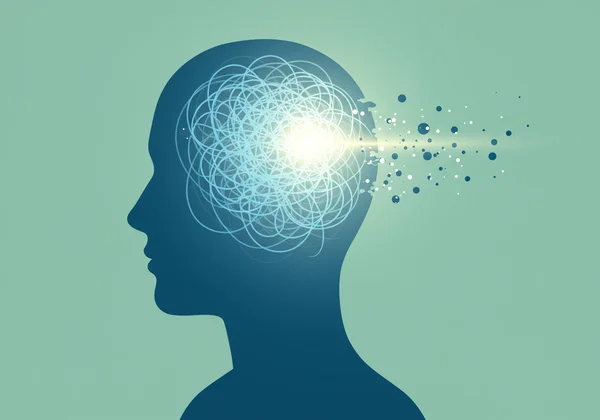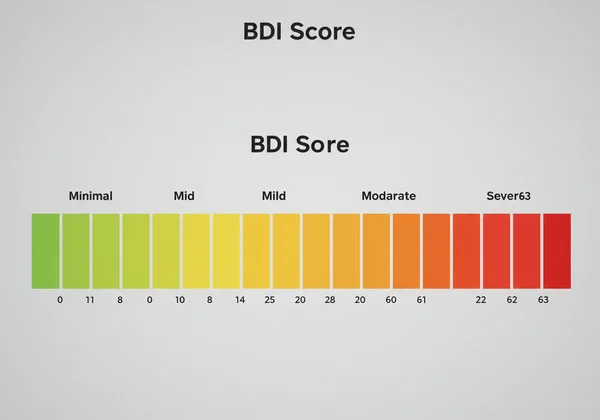What Is the BDI Test? Free Depression Screening & Score Guide
August 26, 2025 | By Beatrice Holloway
Feeling unlike yourself lately? If you're grappling with persistent sadness or a loss of interest, understanding your feelings is the first step toward clarity. This guide introduces the BDI test, also known as the Beck Depression Inventory, a trusted tool for mood self-assessment. It's designed to provide a clear snapshot of your emotional well-being. We'll explain what the test is, how its scoring works, and how our confidential free BDI test can give you instant insights in under 10 minutes, offering a private starting point on your journey to understanding yourself better.
What is the BDI Test for Depression?
The Beck Depression Inventory, or BDI, is one of the most widely used self-report questionnaires for measuring the severity of depression. Think of it as a structured conversation with yourself, guided by 21 carefully crafted questions. Each question explores a specific symptom or attitude associated with depression. This isn't just a random quiz; it's a scientifically designed instrument that helps quantify feelings that can often seem overwhelming and undefined. For decades, it has served as a valuable preliminary tool for individuals and a supportive instrument in the clinical use of BDI for professionals. It provides a score that acts as a temperature check for your emotional health.

The Science Behind the Beck Depression Inventory
To truly trust a tool like this, it’s important to understand its roots. The Beck Depression Inventory was developed by Dr. Aaron T. Beck in the 1960s. He was a pioneering psychiatrist known as the father of Cognitive Behavior Therapy (CBT). Dr. Beck created the BDI based on the symptoms he observed to be most common and significant among individuals with depression. It has been revised since, most notably into the BDI-II, to align with modern diagnostic criteria, ensuring its continued relevance and accuracy. The inventory’s enduring legacy is a testament to its reliability and validity, making it a cornerstone of psychological assessment worldwide.
Who Should Consider Taking This Self-Assessment?
You don't need to be certain you have depression to benefit from the BDI. It’s a helpful tool for a wide range of people. If you're an adult who has been feeling persistently low, irritable, or empty for a couple of weeks, taking our free BDI test can provide valuable clarity. It’s also incredibly useful for college students facing academic and social pressures, or for anyone experiencing a stressful life event. Furthermore, if you are concerned about a friend or family member, understanding this tool can help you gently guide them toward a constructive first step. The BDI empowers you to move from vague worry to concrete information.
What the 21 BDI Test Questions Actually Measure
The power of the BDI lies in its comprehensive approach. The BDI test questions cover the full spectrum of depressive symptoms, which can be grouped into several key areas:
- Emotional Symptoms: Including sadness, guilt, loss of pleasure, and irritability.
- Cognitive Symptoms: Such as pessimism, self-criticism, indecisiveness, and persistent negative thoughts.
- Physical & Behavioral Symptoms: Including fatigue, changes in sleep patterns or appetite, and loss of interest in sex.
By examining each of these facets, the test provides a holistic picture of your experience, far beyond just feeling sad.
How to Interpret Your BDI Test Score (0-63)
Once you complete the questionnaire, you'll receive a score. This number is the key to understanding the results, but it's crucial to interpret it correctly. The score itself is not a label but a guidepost, offering a standardized way to reflect on your current state. The primary goal is to provide a baseline—a starting point from which you can consider your next steps, whether that’s making lifestyle changes, talking to someone you trust, or seeking professional advice. Taking the Beck Depression Inventory (BDI) test is your first step.
The BDI Scoring System Explained: 0 to 63
The BDI scoring is straightforward. The test consists of 21 questions, and each question has four possible response options. These options are weighted with a point value from 0 to 3, representing increasing severity for that specific symptom. For example, a question about sadness might have options ranging from "I do not feel sad" (0 points) to "I am so sad or unhappy that I can't stand it" (3 points). Your total score is calculated by summing the points for each of your 21 answers. This results in a final score that can range from 0 to 63.
BDI Score Ranges: Mild, Moderate, and Severe
Your total score falls into a specific range that corresponds to a level of severity. While different versions might have slight variations, a commonly used interpretation for the BDI-II is:

| Score Range | Level of Depression |
|---|---|
| 0-13 | Minimal Depression |
| 14-19 | Mild Depression |
| 20-28 | Moderate Depression |
| 29-63 | Severe Depression |
Seeing your score placed in one of these categories can be validating. It gives a name to what you've been feeling and confirms that your experience is real and measurable. Knowing whether your symptoms align with a mild, moderate, or severe range can help you and a potential healthcare provider determine the appropriate level of support. You can interpret your BDI-II score with our simple tool.
Important: A Screening Tool, Not a Diagnosis
This is the most critical point to remember: the BDI test is a screening tool, not a diagnostic one. It cannot tell you with certainty that you have clinical depression. A formal diagnosis can only be made by a qualified healthcare professional, such as a psychologist, psychiatrist, or family doctor, through a comprehensive evaluation. Your score is valuable information to bring to that conversation. Think of the BDI as a reliable way to gather data about yourself, empowering you to seek professional help with clear and specific concerns.
Take Our Free BDI Test Online Confidentially
Knowledge is the first step toward feeling better, and we believe access to that knowledge should be simple and free. Our platform offers the BDI test online in a secure, confidential, and user-friendly format. We are committed to making mental health exploration easier for everyone, which is why our core test is available at no cost and in over 15 languages. Our platform is fully optimized for both desktop and mobile devices, so you can take the test whenever and wherever you feel most comfortable.

Get Instant, Private Results in Under 10 Minutes
We respect your time and your privacy. The entire process of taking the BDI test on our site is designed to be quick and seamless, typically taking only 5 to 10 minutes. As soon as you answer the final question, your results are calculated and displayed instantly. There are no sign-ups required and no personal data stored. Your responses are anonymous, providing a safe space to be honest with yourself. Take the free test now and get the immediate feedback you're looking for.
Go Deeper with Optional AI-Powered Insights
For those who want to explore their results further, we offer a unique, optional feature: an AI-powered analysis. This advanced report goes beyond the standard score. It analyzes the patterns in your answers to provide deeper, more personalized insights into your cognitive and emotional tendencies. This can help you understand not just if you are experiencing symptoms, but how they might be interconnected. It's a powerful way to enhance your self-awareness and enrich your conversation with a mental health professional.
Your First Step Towards Emotional Clarity
Navigating your emotional health can feel daunting, but you don't have to do it in the dark. The BDI test is a powerful, scientifically-backed tool that illuminates the path toward understanding. It translates confusing feelings into clear, actionable information, serving as a compassionate and objective starting point. Taking a few minutes to complete a self-assessment is an act of self-care and a courageous first step.
We invite you to use our platform to gain the clarity you deserve. Our test is free, confidential, and instantly accessible. Begin your journey toward a richer, more understood life today. If you found this guide helpful, consider sharing it with someone who might benefit.
Frequently Asked Questions About the BDI Test
What is a normal BDI score?
A "normal" or minimal score on the BDI-II typically falls in the 0-13 range. This suggests that the individual is experiencing few, if any, significant depressive symptoms. It's important to remember that experiencing some level of sadness or discouragement is a normal part of life; this score range reflects that.
Is the BDI test scientifically valid?
Yes, absolutely. The Beck Depression Inventory (both the original and the revised BDI-II) is one of the most well-researched psychological instruments in the world. Numerous studies over decades have demonstrated its high reliability (consistency) and validity (accuracy in measuring what it's intended to measure), making it a trusted tool for both researchers and clinicians.
BDI vs. BDI-II: What's the Difference?
The BDI-II was updated in 1996 to better align with the diagnostic criteria for depression listed in the Diagnostic and Statistical Manual of Mental Disorders, Fourth Edition (DSM-IV). Key changes included modifying questions to assess symptoms over the past two weeks and updating wording to better capture symptoms like agitation, worthlessness, and loss of energy.
What are the results of the BDI test?
The primary result of the BDI test is a numerical score ranging from 0 to 63. This score is then mapped to a severity level, such as minimal, mild, moderate, or severe depression. These results provide a quantitative snapshot of your mood and symptom severity at a specific point in time, helping you and your healthcare provider understand your emotional state. Find your score now to see your personal results.
Can the BDI test be used for teenagers?
While the BDI-II is designed and validated for individuals aged 13 and older, it's crucial that results for adolescents are interpreted with caution and preferably in consultation with a mental health professional or school counselor. Teenagers face unique developmental and social pressures that can influence their responses.